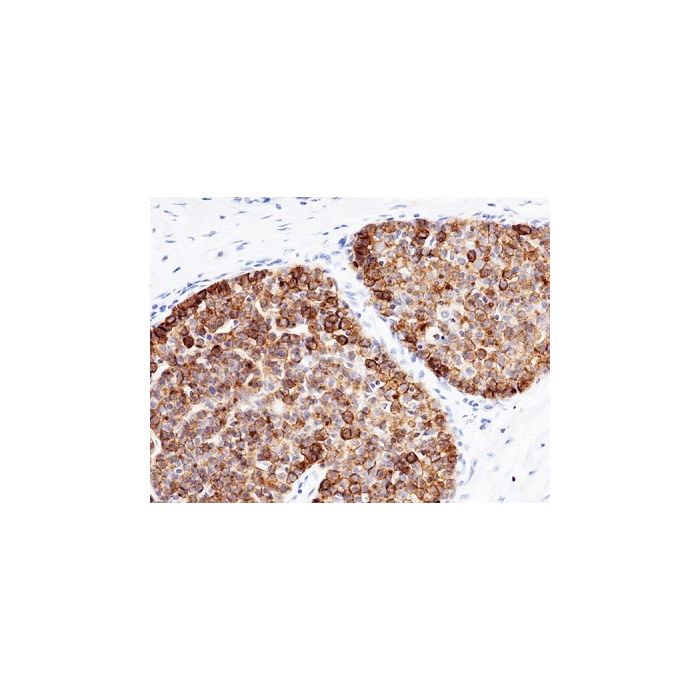Cookie Policy: This site uses cookies to improve your experience. You can find out more about our use of cookies in our Privacy Policy. By continuing to browse this site you agree to our use of cookies.
RevMab
anti-B7-H4 (human), Rabbit Monoclonal (RM525)

| Product Details | |
|---|---|
| Synonyms | B7 homolog 4; V-set Domain-containing T Cell Activation Inhibitor 1; VTCN1; B7h.5; Immune Costimulatory Protein B7-H4; T Cell Costimulatory Molecule B7x; Protein B7S1 |
| Product Type | Recombinant Antibody |
| Properties | |
| Clone | RM525 |
| Isotype | Rabbit IgG |
| Source/Host | Rabbit |
| Immunogen/Antigen | A peptide corresponding to the internal region of human B7H4. |
| Application |
Immunohistochemistry (IHC): 1:100-1:200 dilution Western Blot (WB): 1:1000-1:2000 dilution |
| Crossreactivity | Human |
| Specificity |
This antibody reacts to the human B7-H4 protein. |
| Purity | Protein A purified. |
| Purity Detail | Protein A affinity purified from an animal origin-free culture supernatant. |
| Formulation | Liquid. 50% Glycerol/PBS with 1% BSA and 0.09% sodium azide. |
| Isotype Negative Control | |
| Other Product Data |
Click here for Original Manufacturer Product Datasheet Our product description may differ slightly from the original manufacturers product datasheet. |
| Accession Number | Q7Z7D3 |
| Declaration | Manufactured by RevMab Biosciences. |
| Shipping and Handling | |
| Shipping | BLUE ICE |
| Long Term Storage | -20°C |
| Handling Advice | Avoid freeze/thaw cycles. |
| Use/Stability | Stable for at least 1 year after receipt when stored at -20°C. |
| Documents | |
| Product Specification Sheet | |
| Datasheet |
 Download PDF Download PDF |
B7-H4 is a B7 family member that negatively regulates T cell immunity by inhibiting of T cell proliferation, cytokine production, and cell cycle progression. In vitro, B7-H4 inhibits CD4+ and CD8+ T cell proliferation, cytokine production, and generation of alloreactive cytotoxic T-cells (CTLs). In vivo, blockade of endogenous B7-H4 by specific monoclonal antibody promotes T cell responses. B7-H4 ia an important negative regulator of innate immunity through growth inhibition of neutrophils. B7-H4 is expressed on some tumor cancer cells. The role of B7-H4 in tumor progression may be to transform precancerous cells and then protect them from immunosurveillance.






